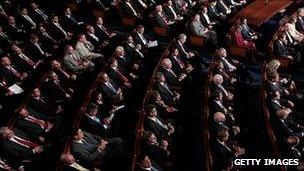Shame, embarrassment and Congress
- Published
- comments

Continuing inaction in Congress is dismaying many seasoned observers of US politics
I'm humming Elvis Costello's (The Angels Wanna Wear My) Red Shoes, external as I watch the latest congressional carry-on, external.
Political reporters, by their very nature, enjoy politics, like its cut and thrust, and above all the rows and arguments that are the lifeblood of any democracy.
But reading coverage of Congress by my American colleagues what comes over is shame and embarrassment. Yet again, the very funding of the government itself has been held up by wrangling between parties, and between the Senate and the House of Representatives.
The Costello line that is repeating in my head is: "I used to be disgusted and now I try to be amused."
But it is the wrong way round. If people here used to find the congressional capers funny, they now despair.
The former Fox News White House correspondent Major Garret asks, external: "Have they gone mad?" A commentator at The Hill pleads, external: "Stop the insanity". The Daily Beast calls it, external a "recurring bad dream".
It is, of course, all about spending versus cuts. The Republicans don't want to pass a bill that spends more on disaster relief without spending cuts elsewhere.
The Democrats don't accept that trade-off. But the stand-off is dangerous.
Remember that in August Standard and Poor's downgraded the US, not because of its economic prospects but because of how near it came to not agreeing a budget and the danger that revealed of "governance and policymaking becoming less stable, less effective, and less predictable".
Perhaps the most interesting take on all of this, external that I have read is from David Frum, who argues: "What's happening before our eyes is that the US congressional system is adopting the attitudes of a Westminster-style parliamentary system."
He points out that only works when one party (or coalition) is in charge, whereas "in a system built around an administration and a bicameral Congress, everybody is part of the government - and the government only functions if there exists a certain baseline spirit of co-operation between the mutually indispensable parts".
Frum argues that the glue that held American government together has dissolved in a partisan, polarised atmosphere, no longer lubricated by prosperity.
He says profound institutional change is needed (he doesn't describe it, but he does at least have some sort of prescription).
Dismay at Washington's shenanigans is so common as to be a cliche, but a growing number argue this isn't simply individuals behaving badly but about a quiet crisis of governance in America.
The trouble is, no-one has faintest clue how to solve it.
- Published27 September 2011
![The US Capitol at night [file pic]](https://ichef.bbci.co.uk/ace/standard/464/mcs/media/images/55602000/jpg/_55602394_006934894-1.jpg)
- Published23 September 2011

- Published13 September 2011
- Published2 August 2011
- Published9 April 2011